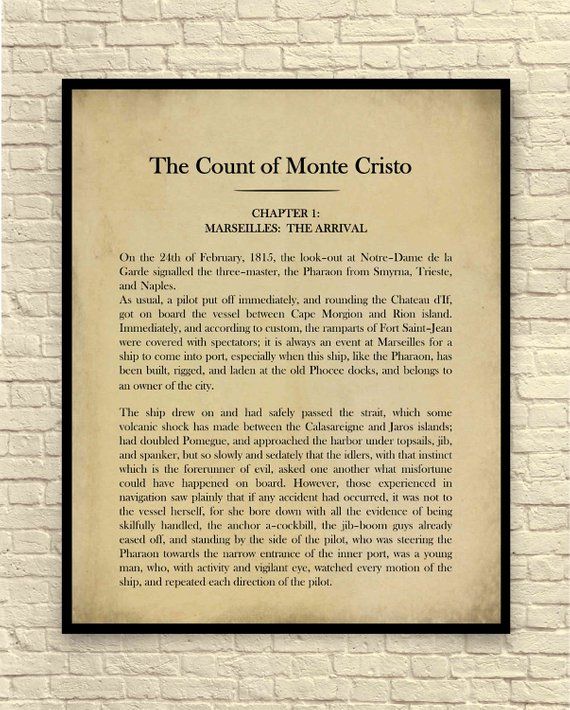A Classic Retold: Reviewing Alexandre Dumas' The Count Of Monte Cristo

Table of Contents
A Tale of Unjust Imprisonment and Unwavering Revenge
The story's heart lies in the unjust imprisonment and subsequent revenge of Edmond Dantès, a young sailor on the cusp of happiness. His narrative is a powerful exploration of injustice and the human capacity for both immense suffering and unwavering resolve.
Edmond Dantès' Fall from Grace
Edmond's downfall is a masterclass in dramatic irony. His seemingly perfect life is shattered by a web of betrayal spun by envious rivals. This conspiracy, fueled by ambition and malice, leads to his false accusation and wrongful imprisonment.
- Danglars: A jealous shipmate driven by greed, Danglars orchestrates the initial accusations against Edmond, initiating the chain of events that leads to his ruin.
- Fernand Mondego: A deceitful and ambitious man, Fernand fuels the conspiracy through his desire to secure his own position and eliminate a romantic rival.
- Villefort: A powerful prosecutor blinded by his own ambition and fear of scandal, Villefort ensures Edmond's conviction, sealing his fate.
The emotional impact of Edmond's imprisonment and the subsequent loss of his beloved Mercédès is profoundly felt throughout the novel. The years spent in the infamous Chateau d'If are depicted with chilling realism, showcasing the crushing weight of injustice and the slow erosion of hope.
The Island of Monte Cristo and the Transformation
Edmond's escape from the Chateau d'If marks a turning point in the narrative. His discovery of a hidden treasure on the island of Monte Cristo fuels his transformation into the enigmatic Count. This isn't merely a physical change; it's a profound intellectual and spiritual metamorphosis.
- Acquisition of Knowledge: Imprisonment becomes a crucible, forging Edmond into a man of exceptional knowledge and skill. He learns languages, fencing, and various other disciplines, preparing him for his elaborate revenge.
- Mastering Disguise: The island provides the perfect environment for Edmond to hone his skills in disguise and manipulation, crucial elements in his subsequent plans.
- Symbolic Significance: Monte Cristo itself becomes a powerful symbol – a place of suffering that ultimately becomes a source of immense power and the launching pad for Edmond’s plan for revenge. The island's isolation allows him to plan meticulously, and its hidden treasures give him the resources to execute his elaborate scheme.
Masterful Plotting and Character Development
The Count of Monte Cristo is renowned for its intricately woven plot and richly developed characters. Dumas masterfully manipulates suspense, weaving a complex tapestry of interconnected events and relationships.
The Intricate Web of Revenge
Dumas's storytelling prowess is evident in the intricate web of revenge that unfolds. The Count's plans are meticulously crafted, each act calculated to dismantle the lives of those who wronged him. The novel is filled with:
- Plot Twists: Unexpected turns and revelations keep the reader guessing, maintaining a high level of suspense throughout.
- Suspenseful Pacing: The narrative expertly balances moments of intense action with periods of deliberate suspense, building anticipation for the Count's next move.
- Narrative Structure: The cyclical structure, echoing the rise and fall of the characters, is a testament to Dumas' storytelling skill.
Exploring the Complex Characters
Beyond the central plot, the novel shines through its compelling characters. Each individual, regardless of their role, possesses depth and complexity.
- Edmond Dantès' Character Arc: Edmond's transformation from a naive young man to a calculating mastermind is a compelling study of human resilience and the corrosive nature of revenge.
- Moral Ambiguity: The antagonists, while clearly villainous, are not one-dimensional caricatures. Their actions are driven by their own ambitions and flaws, creating a moral gray area that adds layers of complexity to the narrative. This moral ambiguity enhances the story's depth.
The Enduring Legacy of The Count of Monte Cristo
The enduring popularity of The Count of Monte Cristo stems from its exploration of timeless themes and its continued relevance to modern audiences.
Thematic Resonance
The novel delves into universal themes that continue to resonate:
- Justice and Revenge: The central conflict between justice and revenge remains a potent and endlessly debated topic.
- Betrayal and Redemption: The story explores the devastating consequences of betrayal and the possibility of redemption, even after committing acts of vengeance.
- Transformative Power of Adversity: Edmond's journey highlights the transformative power of adversity and the human capacity for resilience.
The novel's ending, open to interpretation, invites readers to consider the ultimate cost of revenge and the complexities of achieving true justice.
Adaptations and Cultural Impact
The Count of Monte Cristo's enduring legacy is evident in its numerous adaptations:
- Film Adaptations: From silent films to modern cinematic interpretations, the story has been reimagined countless times for the screen, showcasing its enduring appeal.
- Stage Adaptations: The dramatic narrative translates effectively to the stage, further solidifying its place in popular culture.
- Cultural Influence: The story's influence extends beyond direct adaptations, inspiring countless other works in literature and film.
Conclusion
The Count of Monte Cristo is more than just an adventure story; it's a profound exploration of human nature, justice, and the enduring power of revenge. Dumas' masterful storytelling, intricate plot, and richly developed characters ensure the novel's continued relevance and appeal. This classic tale of betrayal, imprisonment, and transformation continues to captivate readers and audiences alike. Rediscover the captivating world of The Count of Monte Cristo and embark on a thrilling journey of revenge, justice, and redemption. Share your thoughts on this classic in the comments below!

Featured Posts
-
 Sydney Sweeney Shows Off Cleavage After Split From Jonathan Davino
May 04, 2025
Sydney Sweeney Shows Off Cleavage After Split From Jonathan Davino
May 04, 2025 -
 Review The Count Of Monte Cristo Revenge Justice And Redemption
May 04, 2025
Review The Count Of Monte Cristo Revenge Justice And Redemption
May 04, 2025 -
 Cangkang Telur Bekas Jadikan Pupuk Alami Untuk Tanaman Dan Pakan Hewan
May 04, 2025
Cangkang Telur Bekas Jadikan Pupuk Alami Untuk Tanaman Dan Pakan Hewan
May 04, 2025 -
 Berlanga Snubs Plants Fight Offer Focus Shifts To Munguia And Charlo
May 04, 2025
Berlanga Snubs Plants Fight Offer Focus Shifts To Munguia And Charlo
May 04, 2025 -
 Bianca Censori Latest Stunt Sees Her Rollerblading In Italy Without Kanye
May 04, 2025
Bianca Censori Latest Stunt Sees Her Rollerblading In Italy Without Kanye
May 04, 2025
